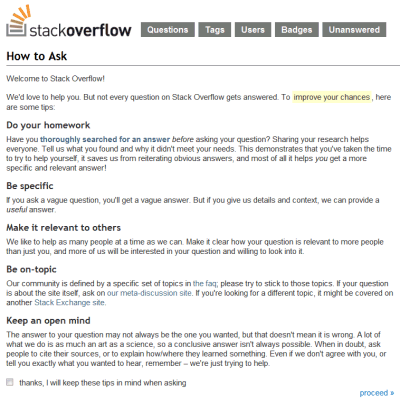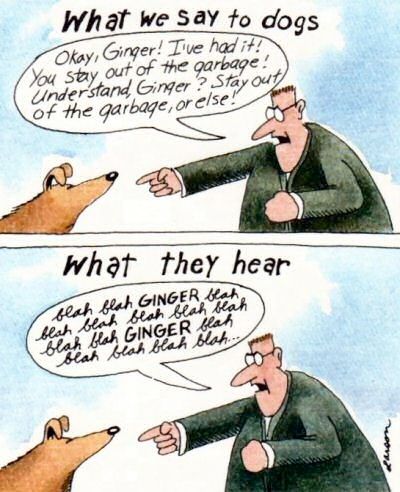As Stack Overflow has grown, it has started to have some decidedly big city problems. The one we are most concerned about is an influx of very low quality questions.
While we still believe in editing and improving low-quality questions to make them better, there's a fundamental mismatch in scale and effort here -- bad questions, asked in bad faith, have a tendency to overwhelm the good intentions of the average Stack Overflow user. So, we've decided to take some steps to block bad questions before they enter our system, and save everyone some effort.
Every new Stack Overflow user with <= 10 reputation is now presented with a mandatory "How To Ask" page that they must click through before asking their first question. The text on this page is a heavily edited subset of Google's excellent Tips for Getting Help.

At this point, you're probably wondering -- did Jeff really just tell me that Stack Overflow now requires every new user to agree to a EULA before asking their first question? Why, yes. Yes I did. Do let me explain the apparent madness.
Unlike a EULA, our How to Ask page is ...
- short, simple, readable language.
- designed to help you, not lawyers -- by teaching you how to ask a decent question that gets the best possible answers!
- mercifully brief; it's 5 simple rules that fit on a single page with no scrolling.
Now, whether or not new users will actually read this, I cannot say.

From my perspective, if at least one in ten new users read it and think, "hey, I should at least try to form a decent question" -- it's a win. If some very poor questions are discarded based on seeing this page -- it's a win. And honestly, when you have 2k+ new questions per day, you can afford to throw a few away in the name of increased overall quality.
Furthermore, this page is designed to be shared and reusable. Free to share the How to Ask link with any question asker in need of advice on how to improve their question.
http://stackoverflow.com/questions/how-to-ask
Beyond this, we're also starting to actively block questions from IPs and accounts that have historically produced a lot of low-quality questions.
The details of this algorithm have to be kept vague, because we don't want people to game it or exploit it. Remember all those question votes you thought were so meaningless? You might want to reconsider that stance. The rationales for voting on questions haven't changed, though:
- if you see a great, thoughtfully asked, well researched question, vote it up -- please! Great questions are an art!
- if you see an egregiously sloppy, no-effort-expended question that you feel was asked in bad faith ... vote it down.
- anything in between that's salvageable, edit it -- or suggest an edit if you lack the 2,000 reputation to edit outright.
We believe asking questions on our site is a privilege, not a right. If, after a few fair attempts, you haven't been able to prove that your contributions to Stack Overflow make it at least ... not-worse ... then we reserve the right to refuse your questions. If we don't do our part to cull the bad questions, then we risk alienating the true experts who provide what really matters: the answers!
For now, these measures are (mostly) only enabled on Stack Overflow, as it's the only site large enough to have these big city problems at the moment. But we certainly hope all of our Stack Exchange network sites get large enough to run into this .. what's the cliche, again? "nice problem to have?"